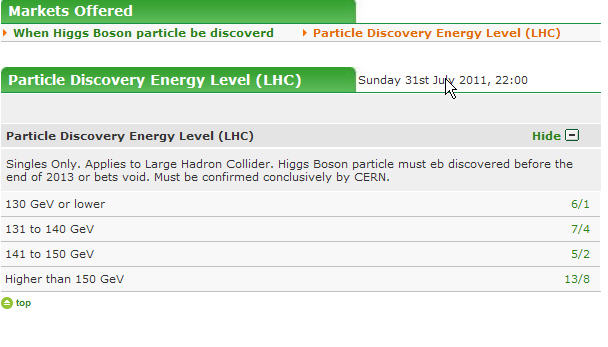To-date, Higgs searches and announcements have been mostly about exclusions - chopping out swaths where physicists know it cannot be to focus the search on where it can be. Now, in the 140 and 145 gigaelectronvolts (GeV) area, they have reported 'interesting' events. 'Interesting' is science speak for uncertainty, but reason for excitement. In order for a result to be considered a discovery, it has to be 5-sigma, only a one in 1,000,000 chance of it being a statistical error. The LHC results are 2.8 sigma level of certainty, so more than a one in 1,000 chance of it being a statistical quirk, while DZero and CDF experiments have also seen something 'interesting' at close to 140GeV but theirs is only 1 sigma.
What does that all mean? Particles have to get mass from somewhere - some place fundamental - and the Higgs boson, proposed by Peter Higgs, would be the missing particle in the Standard Model, the one true particle to rule them all. It's been talked about so much that few people in the public recall anything more than that it is an unfortunately-named 'God particle' but, if found, it basically puts an end to a long-standing debate and, if excluded, it opens up a new frontier in theoretical physics.
To get their results, the Tevatron has searched 700,000 billion proton-antiproton collisions, a lot of data, but the LHC and its higher luminosity can get better results with smaller numbers of inverse femtobarns. That is why so much is happening this year - the Tevatron is scheduled to end its mission in a few months and the LHC has a lot to look at and will only get more.
But likely, if the Higgs exists, someone has already got it and just needs to find it in all that stuff.
Scientists are going to be cautious so if you want to really know what these dizzying statistics and numbers mean, you have to talk to people who understand statistics in a practical way - bookies.
Bookies are legitimate in the United Kingdom. Because the government controls everything there, they even have a state-sponsored bookie, which is likely confusing to capitalists.
Paddy Power is one publicly-traded oddsmaker in the UK - bookies - and they know their physics, it seems. They have been taking odds on the mass-energy level where the Higgs Boson will be discovered and between 131-140GeV (billion electron volts) is the 13/8 favorite. That's a pretty big range to physicists but keep in mind that a bookie is not trying to make money from being right about an event happening or not, he is more like an insurance guy protecting himself from being wrong. Bookies try to position the odds so that the chance of the result people are betting on occurring is around 50/50 - they pay money to winners and collect money from losers plus 10%, the juice. 10% on every event is quite a lot of money so they don't need to do anything but be the best insurance agent they can be - thus, even if a bookie may feel like something is a lock, if he gets too many bets for one side on one set of odds he will lay off those bets with another bookie to protect his assets from a fluke occurrence and a large loss and change the odds. Insurance companies, like I said.
Paddy Power had odds on the Higgs Boson particle being scientifically proven to exist before the end of 2011 at 12/1 but due to the recent announcements I mentioned before they just brought those down to 1/3.
So if you were a sharp-eyed Science 2.0 reader and read Tommaso's blog, you could have gotten 12-1 odds yesterday instead of a 1/36th return on that today. That sounds terrific, right? Ken Robertson, spokesman at Paddy Power said “It seems that we’ve been taught a lesson about what happens when you don’t keep on top of particle physics!”
Well, maybe not.
When a representative for a successful casino has that 'I guess you got us' tone, reach for your wallet. Here are their current odds related to Higgs:
| Year | Odds |
| 2011 | 1/3 |
| 2012 | 4/1 |
| 2013+ | 5/1 |
| Mass-energy | Odds |
| 130 GeV or lower | 6/1 |
| 131-140 GeV | 13/8 |
| 141-150 GeV | 5/2 |
| 150 GeV+ | 7/4 |
What do you see missing in there? A way to bet on if there is no Higgs found at all. Their disclaimer even says "Higgs Boson particle must eb (sic) discovered before the end of 2013 or bets void. Must be confirmed conclusively by CERN."

Bookies are in the business of making bets as fair as possible but there is no way to make a needle-in-a-haystack bet fair - which means you are a sucker if you pick any bet at all. These guys really do know their particle physics.
Play some roulette instead. I can at least give you a shot at winning there.




Comments